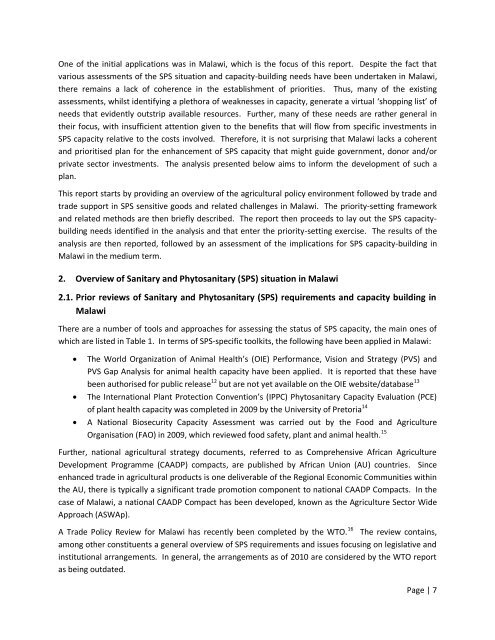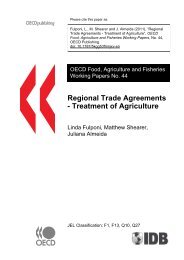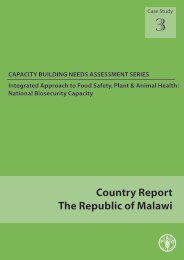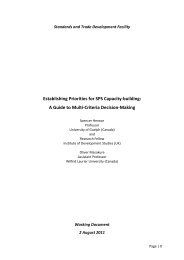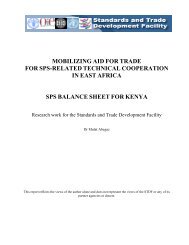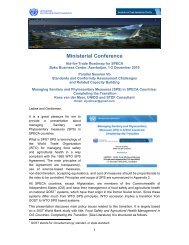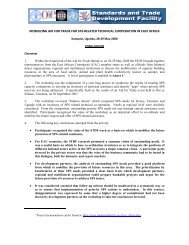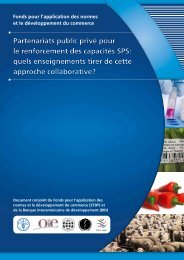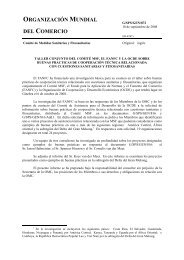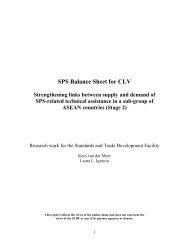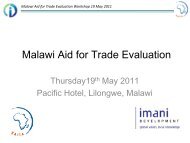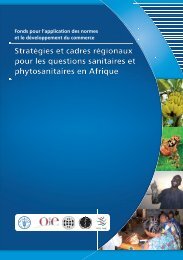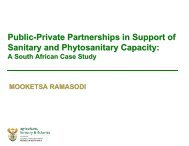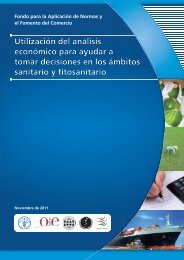MCDA Final Report Malawi - Standards and Trade Development ...
MCDA Final Report Malawi - Standards and Trade Development ...
MCDA Final Report Malawi - Standards and Trade Development ...
Create successful ePaper yourself
Turn your PDF publications into a flip-book with our unique Google optimized e-Paper software.
One of the initial applications was in <strong>Malawi</strong>, which is the focus of this report. Despite the fact that<br />
various assessments of the SPS situation <strong>and</strong> capacity-building needs have been undertaken in <strong>Malawi</strong>,<br />
there remains a lack of coherence in the establishment of priorities. Thus, many of the existing<br />
assessments, whilst identifying a plethora of weaknesses in capacity, generate a virtual ‘shopping list’ of<br />
needs that evidently outstrip available resources. Further, many of these needs are rather general in<br />
their focus, with insufficient attention given to the benefits that will flow from specific investments in<br />
SPS capacity relative to the costs involved. Therefore, it is not surprising that <strong>Malawi</strong> lacks a coherent<br />
<strong>and</strong> prioritised plan for the enhancement of SPS capacity that might guide government, donor <strong>and</strong>/or<br />
private sector investments. The analysis presented below aims to inform the development of such a<br />
plan.<br />
This report starts by providing an overview of the agricultural policy environment followed by trade <strong>and</strong><br />
trade support in SPS sensitive goods <strong>and</strong> related challenges in <strong>Malawi</strong>. The priority-setting framework<br />
<strong>and</strong> related methods are then briefly described. The report then proceeds to lay out the SPS capacitybuilding<br />
needs identified in the analysis <strong>and</strong> that enter the priority-setting exercise. The results of the<br />
analysis are then reported, followed by an assessment of the implications for SPS capacity-building in<br />
<strong>Malawi</strong> in the medium term.<br />
2. Overview of Sanitary <strong>and</strong> Phytosanitary (SPS) situation in <strong>Malawi</strong><br />
2.1. Prior reviews of Sanitary <strong>and</strong> Phytosanitary (SPS) requirements <strong>and</strong> capacity building in<br />
<strong>Malawi</strong><br />
There are a number of tools <strong>and</strong> approaches for assessing the status of SPS capacity, the main ones of<br />
which are listed in Table 1. In terms of SPS-specific toolkits, the following have been applied in <strong>Malawi</strong>:<br />
<br />
<br />
<br />
The World Organization of Animal Health’s (OIE) Performance, Vision <strong>and</strong> Strategy (PVS) <strong>and</strong><br />
PVS Gap Analysis for animal health capacity have been applied. It is reported that these have<br />
been authorised for public release 12 but are not yet available on the OIE website/database 13<br />
The International Plant Protection Convention’s (IPPC) Phytosanitary Capacity Evaluation (PCE)<br />
of plant health capacity was completed in 2009 by the University of Pretoria 14<br />
A National Biosecurity Capacity Assessment was carried out by the Food <strong>and</strong> Agriculture<br />
Organisation (FAO) in 2009, which reviewed food safety, plant <strong>and</strong> animal health. 15<br />
Further, national agricultural strategy documents, referred to as Comprehensive African Agriculture<br />
<strong>Development</strong> Programme (CAADP) compacts, are published by African Union (AU) countries. Since<br />
enhanced trade in agricultural products is one deliverable of the Regional Economic Communities within<br />
the AU, there is typically a significant trade promotion component to national CAADP Compacts. In the<br />
case of <strong>Malawi</strong>, a national CAADP Compact has been developed, known as the Agriculture Sector Wide<br />
Approach (ASWAp).<br />
A <strong>Trade</strong> Policy Review for <strong>Malawi</strong> has recently been completed by the WTO. 16 The review contains,<br />
among other constituents a general overview of SPS requirements <strong>and</strong> issues focusing on legislative <strong>and</strong><br />
institutional arrangements. In general, the arrangements as of 2010 are considered by the WTO report<br />
as being outdated.<br />
Page | 7


